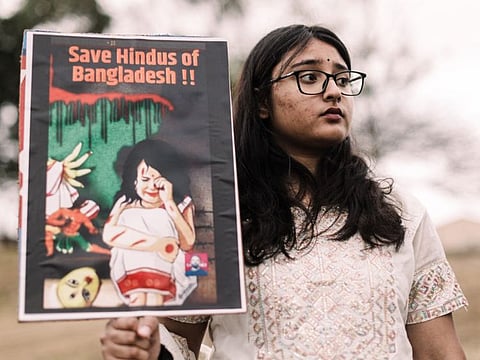New Bangladesh govt says working to ‘resolve’ attacks on minorities
Hindus largest minority faith considered steadfast support base for Hasina’s party

DHAKA: Bangladesh’s new interim government said on Sunday it was working to resolve attacks on Hindus and other religious minorities reported after the dramatic ouster of autocratic premier Sheikh Hasina.
Hindus are the largest minority faith in mostly Muslim Bangladesh and are considered a steadfast support base for Hasina’s party, the Awami League.
After Hasina’s abrupt resignation and flight abroad on Monday brought an end to her 15 years of autocratic rule, there were numerous reports of attacks against Hindu households, temples and businesses.
“The attacks on religious minorities in some places have been noted with grave concern,” the interim cabinet said in its first official statement since its Thursday appointment.
Also Read: Twelve killed in twin Bangladesh jailbreaks
The cabinet said it would “immediately sit with the representative bodies and other concerned groups to find ways to resolve such heinous attacks”.
Sunday’s statement from the self-styled “council of advisors” tasked with steering democratic reforms in the South Asian nation of 170 million people listed numerous urgent priorities.
The government, led by Nobel peace laureate Muhammad Yunus, ordered “support” for the families of protesters who were killed in the weeks of demonstrations culminating in Hasina’s departure.
It directed public funds to pay for those injured in the unrest, which began in July and killed more than 450 people.
The council also said it would reopen the metro system in the capital Dhaka by the end of the week and soon appoint a new central bank governor, replacing a Hasina loyalist forced to resign.
Institutional purge
Earlier in the day a new chief justice was sworn in to office the day after his predecessor, another Hasina ally accused of sublimating the Supreme Court to her government’s will, quit following protester demands.
It is the latest in a string of fresh appointments to replace an old guard viewed as linked to the previous regime, ousted by the student-led uprising.
New top justice Syed Refaat Ahmed studied at the University of Dhaka, Oxford and Tufts University in the United States.
Ahmed replaced Obaidul Hassan after hundreds of protesters gathered outside the court to demand the latter step-down.
Appointed last year, Hassan earlier oversaw a much-criticised war crimes tribunal that ordered the execution of Hasina’s opponents, and his brother was her longtime secretary.
Hasina, 76, fled by helicopter to neighbouring India on Monday as protesters flooded Dhaka’s streets in a dramatic end to her rule.
Interim leader Yunus, 84, returned from Europe on Thursday to lead a temporary administration facing the monumental challenge of ending disorder and enacting democratic reforms.
The restoration of law and order was the caretaker administration’s “first priority”, Yunus said.
Yunus won the Nobel Peace Prize in 2006 for his pioneering work in microfinance, credited with helping millions of Bangladeshis out of grinding poverty.
He took office as “chief advisor” to a caretaker administration, comprised of fellow civilians bar one retired brigadier-general, and has said he wants to hold elections “within a few months”.
Sign up for the Daily Briefing
Get the latest news and updates straight to your inbox



